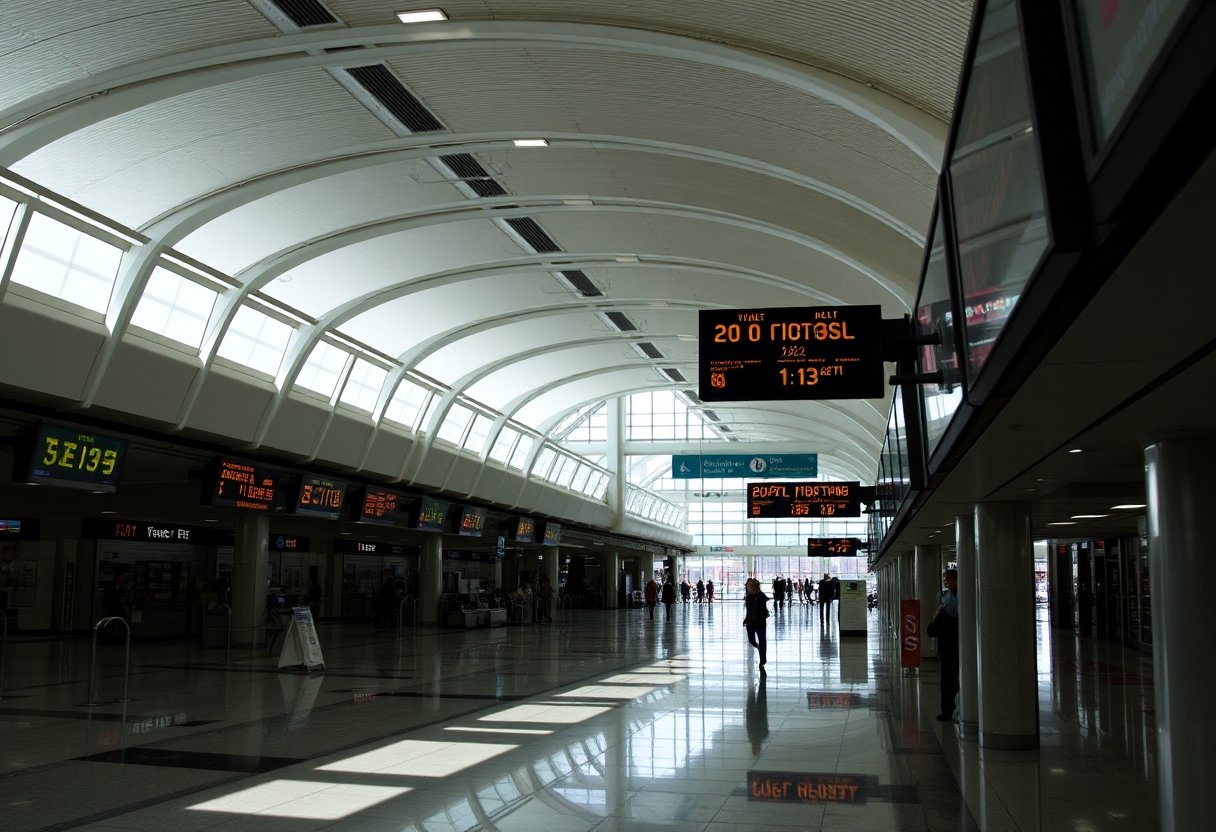Airports are centre points of steady action, and the significance of timekeeping inside these spaces cannot be downplayed. Fentress Airplane terminal, like numerous other major transportation centres, depends on exact and productive time administration to guarantee smooth operations, reliable flights and entries, and an ideal traveller stream. A noteworthy donor to this timekeeping effectiveness has been the computerized clocks introduced all through the air terminal. In this article, we will investigate the advancement, importance, and effect of advanced clocks at Fentress Airplane terminal, digging into their mechanical progressions, the challenges they offer assistance moderate, and how they reflect the broader patterns in present-day timekeeping at airports.
1. Fentress Airplane terminal: A Advanced Transportation Hub
Fentress Air terminal, a key worldwide aeroplane terminal, serves millions of travellers every year and plays a basic part in worldwide discussion travel. With flights withdrawing to various goals around the world, timing and synchronization are essential to keeping up smooth operations. From check-ins and security conventions to boarding doors and flight plans, time-sensitive methods are the spine of the airport’s functioning.
Digital clocks have gotten to be a vital portion of this foundation, encouraging precise and dependable timekeeping in an environment where each moment checks. These clocks are not fair utilitarian; they are a portion of a bigger framework that guarantees the proficient operation of the airport’s whole ecosystem.
2. The Part of Time in Airplane Terminal Operations
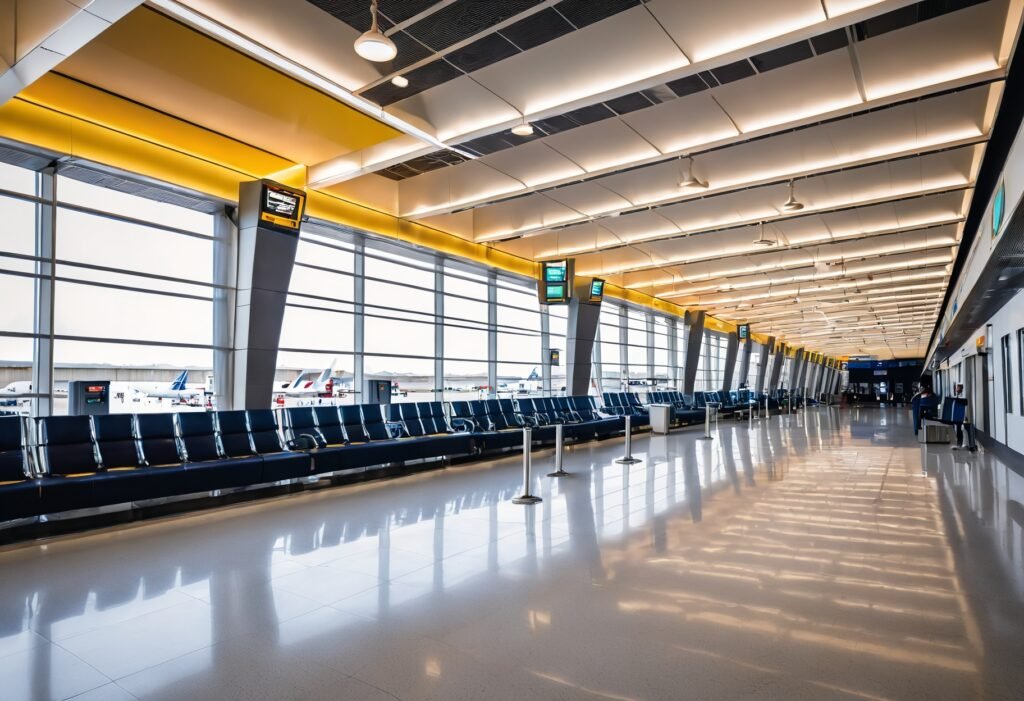
The importance of time in air terminal situations goes past essentially knowing when a flight withdraws. Numerous air terminal frameworks are complicatedly tied to exact timekeeping. Let’s take a closer seem at the different aspects of air terminal operations that depend intensely on exact time management:
a. Flight Schedules
The synchronization of flight plans over the globe is a complex preparation. Aeroplane terminals depend on Facilitated inclusive Time (UTC) to guarantee that flight timings stay reliable over diverse time zones. For travellers, knowing the correct nearby time at any given minute is significant for guaranteeing that they can reach their takeoff entryways on time.
Digital clocks, with their easy-to-read shows and exactness, offer assistance to travellers exploring the aeroplane terminal effectively. These clocks moreover contribute to guaranteeing that carriers keep up promptness, diminishing delays and making strides the in general travel experience.
b. Ground Dealing with Operations
Airport ground staff have extended obligations, including aeroplane upkeep, fueling, things taken care of, and catering administrations. All these assignments require to be performed inside tight time windows between flight entries and takeoffs. Computerized clocks offer assistance ground dealing with groups remain on plan, anticipating delays that might lead to disturbances in the whole system.
c. Traveler Management
Efficient traveller administration is significant at active air terminals like Fentress. From security checkpoints to boarding doors, travellers must move through the air terminal in a convenient way. Advanced clocks put deliberately all through the air terminal offer assistance to travellers to remain on the beat with their plans, diminishing push and minimizing the chance of missed flights.
3. The Move to Advanced Clocks

While analogue clocks were once a standard installation in air terminals around the world, the move to advanced clocks has been a key viewpoint of modernization endeavours. Fentress Air terminal has been at the cutting edge of this innovative move, grasping computerized clocks for a few reasons:
a. Accuracy
Digital clocks give a level of accuracy that analogue clocks cannot coordinate. Since air terminal operations require exactness to the moment, advanced clocks are able to keep time with negligible deviations. This is particularly critical in the flying industry, where indeed slight varieties in timekeeping can have critical consequences.
b. Ease of Reading
The clear and striking shows of advanced clocks make them simple to peruse, indeed from a separate. This is especially critical in huge, swarmed spaces like air terminals, where travellers and staff are required to get to time data rapidly and without disarray. Advanced clocks frequently come with backlighting, making them obvious in low-light conditions, such as amid nighttime operations or in faintly lit areas of the terminal.
c. Support and Reliability
Unlike analogue clocks, which require normal upkeep to guarantee their mechanical components are working accurately, computerized clocks require moderate moo upkeep. Present-day advanced clocks are built with a life span in intellect and are regularly associated with centralized frameworks that can naturally alter for time zone changes or sunshine-sparing time.
d. Integration with Other Systems
One of the key benefits of computerized clocks at Fentress Airplane terminal is their integration with other frameworks, such as flight data shows (FIDs), open address frameworks, and aeroplane terminal administration programs. This integration guarantees that the time shown on computerized clocks all through the air terminal is continuously synchronized with official flight times, diminishing the hazard of discrepancies.
4. Innovative Headways in Air Terminal Clocks
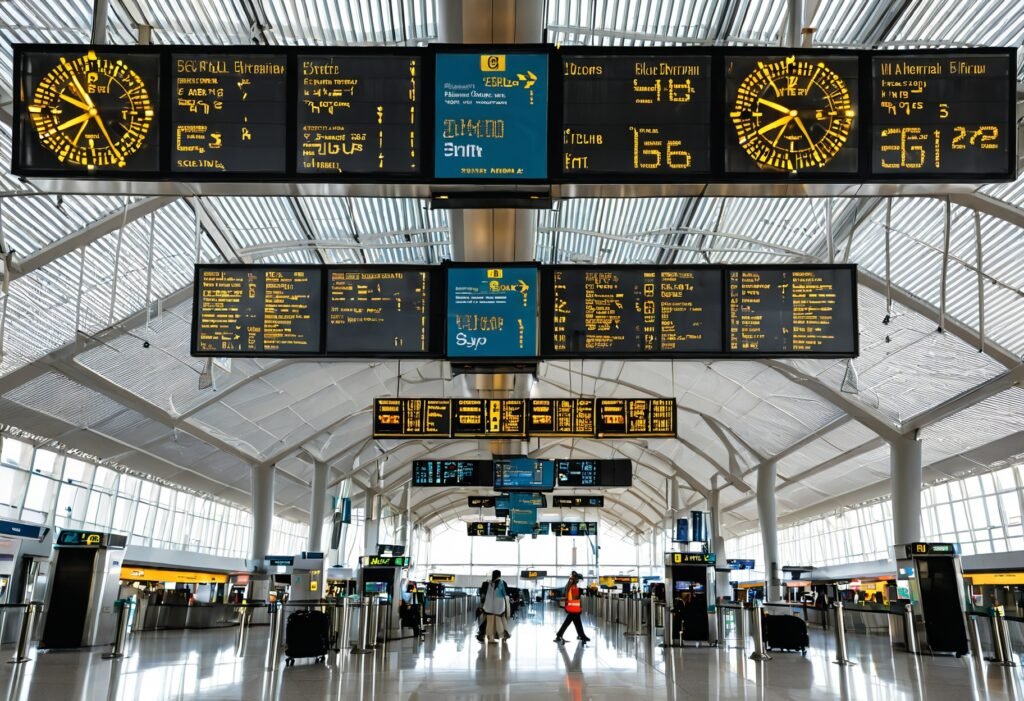
As innovation proceeds to progress, so as well have the advanced clocks at Fentress Airplane terminal. Present-day advanced clocks presently include a run of capabilities that improve their usefulness and contribute to the general productivity of air terminal operations.
a. Organized Time Systems
The computerized clocks at Fentress Air terminal are a portion of an organized time framework, meaning they are all associated to a central server that guarantees they show the same, exact time. This dispenses with the hazard of distinctive clocks appearing at somewhat diverse times, which seem to cause perplexity for both travellers and staff.
Networked time frameworks to permit further checking and alterations, making it simple for air terminal administration to guarantee that all clocks are working accurately. If a clock breakdowns or loses association with the central server, the framework can consequently inform upkeep staff to address the issue.
b. Synchronization with Worldwide Time Standards
To guarantee that flight plans are adjusted with universal guidelines, Fentress Airport’s computerized clocks are synchronized with worldwide timekeeping frameworks, such as the Worldwide Situating Framework (GPS) and the Arrange Time Convention (NTP). This synchronization guarantees that the aeroplane terminal works at the same time as other aeroplane terminals around the world, lessening the hazard of planning clashes or miscommunication.
c. Shrewd Clocks and Automation
In later a long time, the rise of shrewd clocks has included modern measurement to advanced timekeeping. Keen clocks are able of altering to changes in time zones, flight delays, and other energetic factors consequently. At Fentress Airplane terminal, shrewd clocks are coordinated with real-time flight information, empowering them to give precise countdowns to flight takeoffs or alter to last-minute plan changes.
Smart clocks too contribute to vitality proficiency. They can be modified to dim amid periods of moo movement or at night, decreasing power utilization while still giving basic timekeeping services.
5. The Benefits of Computerized Clocks for Passengers
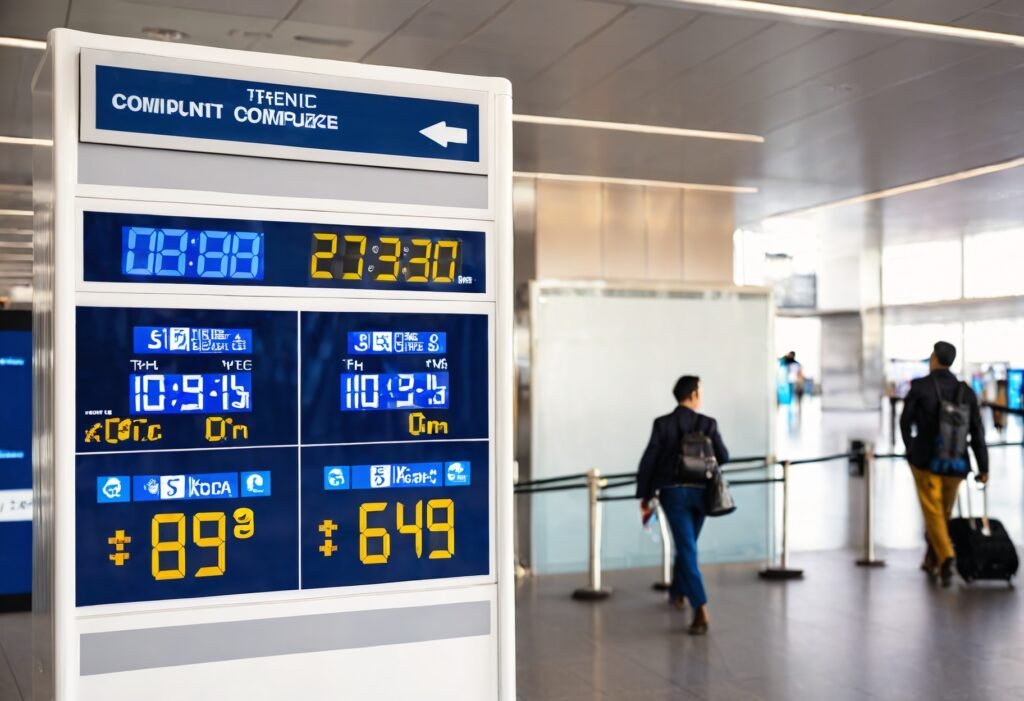
For travellers, advanced clocks offer a few benefits that make strides they by and large air terminal experience:
a. Diminished Anxiety
Travelling can be upsetting, particularly for travellers who are concerned about almost making it to their flights on time. Computerized clocks, with their clear and exact shows, offer assistance to lighten this uneasiness by giving travellers precise time data at each arrange of their travel through the airport.
b. Upgraded Efficiency
Digital clocks are frequently set close to key zones, such as check-in counters, security checkpoints, and boarding entryways, guaranteeing that travellers can effectively keep track of the time. This contributes to a smoother traveller stream, lessening bottlenecks and making a difference in travellers making it to their flights with negligible delays.
c. Availability Features
Many advanced clocks at the Fentress Air terminal are outlined with openness in intellect. Clocks with bigger shows, sound-related time declarations, or braille highlights guarantee that all travellers, counting those with visual or hearing impedances, can get to exact time information.
6. Challenges and Arrangements in Overseeing Timekeeping Systems
Despite the preferences, keeping up a comprehensive and exact advanced clock framework at an aeroplane terminal like Fentress comes with its challenges. Here are a few of the key deterrents confronted and how they are addressed:
a. Framework Malfunctions
Digital clocks, like any other electronic gadget, are helpless to breakdowns. This can extend from minor issues like time show blunders to total framework disappointments. Fentress Airplane terminal utilizes a committed IT group that screens the clock organizes it in real-time. In the occasion of a breakdown, the group can rapidly distinguish and resolve the issue, minimizing disruptions.
b. Time Zone Differences
Given that Fentress Airplane terminal serves universal flights, time zone contrasts can in some cases pose a challenge, especially for travellers who may be befuddled about the time shown on clocks versus the time in their goal. To moderate this, the air terminal noticeably shows the neighbourhood time near UTC or time zone pointers at major checkpoints and data kiosks.
c. Sunshine Sparing Adjustments
Daylight-sparing time alterations can moreover cause perplexity, especially for travellers arriving or leaving on the days when the clocks alter. Fentress Airport’s computerized clock framework is modified to naturally alter for sunshine-sparing time, guaranteeing that all clocks stay precise without requiring manual intervention.
7. Future of Computerized Clocks at Fentress Airport
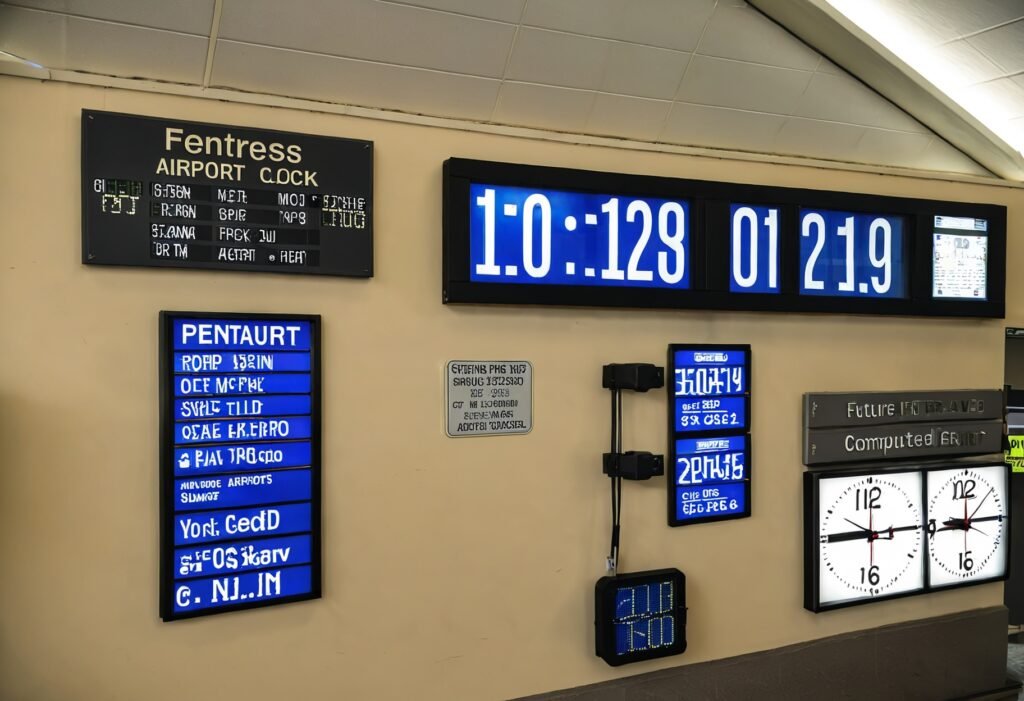
As innovation proceeds to advance, so as well will the advanced clocks at Fentress Air terminal. Here are a few potential future advancements in air terminal timekeeping:
a. Counterfeit Insights Integration
In the future, computerized clocks at Fentress Airplane terminal seem to be coordinated with fake insights (AI) frameworks that foresee and account for potential flight delays, climate conditions, or traveller blockage. AI-driven timekeeping frameworks may consequently alter to reflect real-time conditions, giving travellers more precise and up-to-date information.
b. Wearable Tech Synchronization
With the rise of wearable innovations such as smartwatches, future computerized clocks at Fentress Air terminal might be synchronized with passengers’ individual gadgets. This would permit travellers to get real-time time overhauls and notices specifically on their wearable tech, diminishing the requirement to depend exclusively on physical clocks.
c. Eco-Friendly Timekeeping Solutions
As air terminals endeavour to diminish their carbon impressions, the following era of advanced clocks may consolidate eco-friendly advances, such as solar-powered frameworks or clocks made from feasible materials. These advancements would contribute to Fentress Airport’s maintainability objectives while keeping up precise timekeeping.
Conclusion
The computerized clocks at Fentress Airplane terminal speak to more than fair a means of telling time—they are a basic component of the airport’s operational framework. From improving
traveller encounters to guaranteeing that flights run on the plan, these clocks play a fundamental part in keeping the aeroplane terminal working easily. As innovation proceeds to advance, so as well will the capabilities of advanced clocks, making them indeed more fundamental to the future of air terminal operations. Whether through AI integration, wearable tech synchronization, or eco-friendly plans, the future of advanced clocks at Fentress Air terminal is bound to be as energetic and inventive as the industry they serve.
